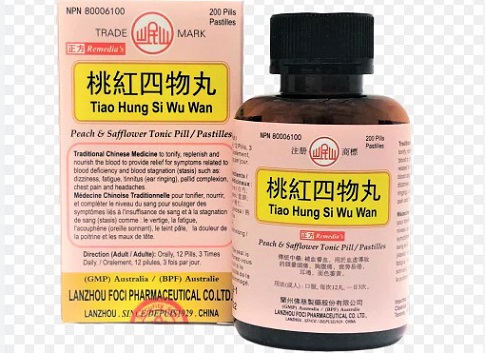New Hope for Elderly Hip Fracture Patients - Traditional Chinese Medicine Shows Promise in Preventing Postoperative Delirium
Nikhil Prasad Fact checked by:Thailand Medical News Team Jun 22, 2024 1 year, 5 months, 4 weeks, 1 day, 3 hours, 57 minutes ago
TCM News: Elderly patients undergoing hip fracture surgery face numerous challenges, one of the most concerning being postoperative delirium (POD). This condition significantly hampers recovery and reduces the overall quality of life. However, a new study by scientists from the Xiangyang Institute of Traditional Chinese Medicine, Hubei-China that is covered in this
TCM News report, has revealed that a traditional Chinese herbal formula, Taohong Siwu Decoction (THSWD), may offer a promising solution.
 Traditional Chinese Medicine Shows Promise in Preventing Postoperative
Traditional Chinese Medicine Shows Promise in Preventing Postoperative
Delirium for Elderly Hip Fracture Patients
Understanding Postoperative Delirium
Postoperative delirium is a sudden and severe state of confusion that typically occurs within days after surgery. For elderly patients, especially those with hip fractures, the risk is particularly high. The symptoms include attention deficits, disturbances in consciousness, and cognitive impairments, affecting 16.9% to 70% of these patients. This condition not only prolongs hospital stays but also increases mortality rates and medical costs.
The Role of Inflammation
Research indicates that neuroinflammation, an inflammatory response in the nervous system, is a key factor in developing POD. Surgical trauma triggers the release of inflammatory mediators, such as COX-2 and TNF-α, into the brain, contributing to the onset of delirium.
Introducing Taohong Siwu Decoction
Taohong Siwu Decoction (THSWD) is a traditional Chinese medicine known for its ability to promote blood circulation and reduce blood stasis. The formula includes six herbs: Angelicae Sinensis Radix, Rehmanniae Radix Praeparata, Paeoniae Radix Alba, Chuanxiong Rhizoma, Persicae Semen, and Carthami Flos. These herbs are believed to alleviate various neurological disorders through their antioxidant, anti-apoptotic, and anti-inflammatory effects.
Study Overview
The study team conducted a retrospective analysis of patients with intertrochanteric fractures who received THSWD treatment. The aim was to evaluate the clinical efficacy of THSWD in preventing POD and to explore its underlying mechanisms through network pharmacology and molecular docking.
Key Findings
-Improved Blood Parameters: Patients treated with THSWD showed increased hemoglobin (HB) levels and reduced blood urea nitrogen (BUN) and C-reactive protein (CRP) levels. These changes indicate better overall health and a reduced risk of delirium.
-Reduced Delirium Incidence and Duration: The THSWD group had significantly fewer instances of delirium compared to the control group (8 out of 82 patients versus 31 out of 79). Moreover, the duration of delirium episodes was shorter in the THSWD group.
-Enhanced Recove
ry: Patients who received THSWD demonstrated better recovery outcomes, as evidenced by higher Harris Hip Scores (HHS) three months post-surgery.
Mechanisms of Action
The study employed network pharmacology to identify the primary targets and mechanisms of THSWD in managing delirium. The analysis revealed that THSWD might work through inflammatory pathways, including the IL-17 and NF-kappa B signaling pathways. Molecular docking studies confirmed the interaction between THSWD’s active ingredients and COX-2, suggesting a direct anti-inflammatory effect.
Significance of Findings
The ability of THSWD to reduce inflammatory factors like COX-2, IL-1β, IL-6, and TNF-α in the blood is crucial. These inflammatory markers are known to contribute to neuroinflammation and cognitive impairments. By lowering their levels, THSWD helps mitigate the development and severity of POD.
Conclusion
The findings suggest that THSWD is a promising treatment for preventing and reducing the duration of POD in elderly hip fracture patients. Its benefits extend beyond inflammation reduction, as it also improves hemoglobin levels and overall recovery. This study underscores the potential of integrating traditional Chinese medicine into modern clinical practices, offering a complementary approach to managing postoperative complications.
Moving Forward
While the study provides compelling evidence of THSWD’s efficacy, further research with larger sample sizes and control groups is necessary to confirm these findings. Nonetheless, the current results are a significant step toward improving postoperative care for elderly patients and highlight the potential benefits of traditional herbal medicines in contemporary healthcare.
The study findings were published in the peer reviewed Journal of Orthopaedic Surgery and Research.
https://link.springer.com/article/10.1186/s13018-024-04854-1
For the latest
TCM News, keep on logging to Thailand Medical News.
Read Also:
https://www.thailandmedical.news/news/new-hope-for-kidney-recovery-traditional-chinese-medicine-s-role-in-renal-regeneration
https://www.thailandmedical.news/news/new-hope-for-nerve-injury-recovery-combining-traditional-chinese-medicine-with-modern-biomaterials
